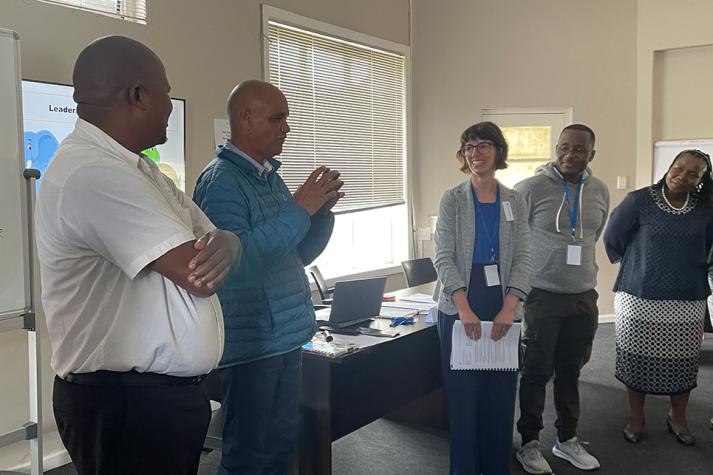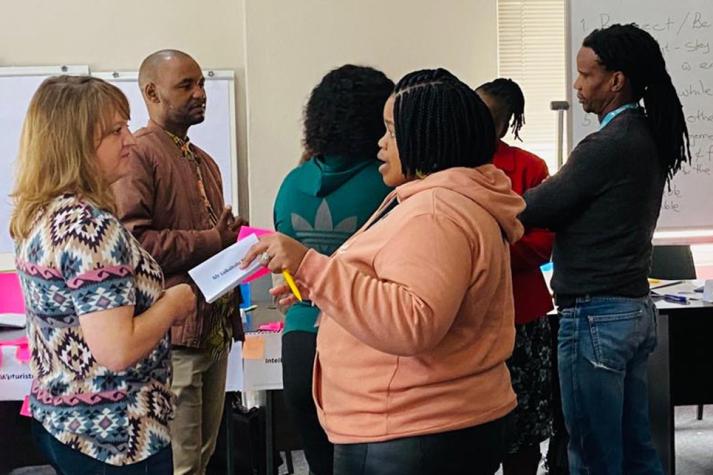COLUMBIA, Mo. – To an outside eye, the classroom packed with faculty members and community leaders would have looked like a run-of-the-mill training or seminar.
But for Wilson Majee, an associate professor of health sciences and public health with the University of Missouri College of Health Sciences, that lively discussion represented a full-circle experience.
Majee, who grew up in rural Zimbabwe and worked as a community development specialist with MU Extension before he became faculty at Mizzou, said it was incredible to see those two areas of his life collide in a meaningful way.
“I came to where I am because of MU Extension,” Majee said. “Bringing extension faculty to Africa with me this summer was a powerful and transformative experience. Transformative in the ways the program participants engaged with the program and in the knowledge and experience exchanges that happened between the Mizzou team and local residents.”
Following his Fulbright experiences in South Africa in 2023, Majee worked with MU Extension and University of Missouri–St. Louis Neighborhood Leadership Academy (NLA) organizers Claire Rippel and Sarah Hultine Massengale to bring a contextualized version of the program to Port Alfred in the Eastern Cape province of South Africa this June. Participants included 16 grassroots leaders from the region and four Stenden South Africa faculty members.
Since launching in 2002, the NLA has brought together community leaders who are interested in driving positive change in their communities. Typical participants range from business owners and block captains to neighborhood association presidents and community activists.
Through a series of training sessions, the academy provides participants with personal leadership skills, project planning and implementation tools, organizational leadership and management practices, and community-building strategies.
Extending beyond Missouri
Claire Rippel, community development education director at MU Extension, has been involved with the NLA program for more than eight years. Rippel described Majee as the “spark that created this partnership,” crediting connections he forged during his Fulbright fellowship as the impetus for bringing the leadership program to South Africa.
Although this was the first time bringing the Neighborhood Leadership Academy beyond the borders of the U.S., Rippel said she appreciated the similarities she observed between Missouri and South Africa.
“There are these very powerful philosophical bonds between Missouri and St. Louis and the community we worked with in South Africa,” Rippel said. “Whether you’re in Port Alfred, South Africa, or Ferguson, Missouri, there are people who are deeply dedicated to improving their communities — who are seeking skills, relationships and tools to be more effective in that work.”
Lessons in translation
Sarah Hultine Massengale, a state specialist in community development with MU Extension, worked with Rippel and Majee to adjust the core NLA curriculum for a South African audience. The team spent close to six months before the trip distilling 10 weeks’ worth of curriculum into four weeks of programming for the group of grassroots leaders in South Africa.
While some aspects of the program translated perfectly for the different audience, Hultine Massengale said it wasn’t all smooth sailing.
“For instance, one of the icebreakers we use asks people what they ‘geek out about,’ and it just didn’t translate,” she said. “But we came out of the experience learning some alternative ways to break the ice through more active methods, which is something we hope to apply to future sessions. We also gave participants opportunities to share icebreakers, and we learned from that.”
In the process of adjusting the Neighborhood Leadership Academy for the South African audience, the organizers ended up coming through every single line of the curriculum to ensure it was relevant and culturally competent. The team believes that massive investment on the front end will make it easier to adapt the NLA program for future international audiences.
Majee said the team is seeking funding to bring the leadership academy to the Mangosuthu University of Technology in Durban, South Africa, in 2025.
“Now we have a method for how you can scale NLA in any community,” Rippel said. “But whether it’s in rural Iowa, Norway or China, we know we need deep partnerships with local stakeholders to be successful. I think this is just the beginning for NLA of seeing how the impact can grow not only in Missouri but also more broadly around the world.”
Written by Ryan Gauthier. Originally posted by the MU College of Health Sciences.

